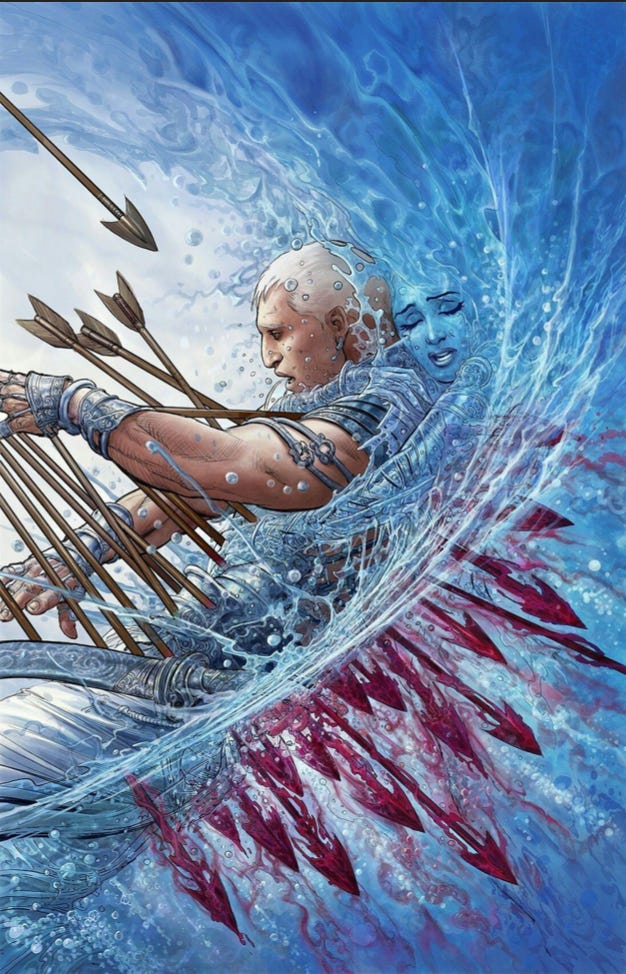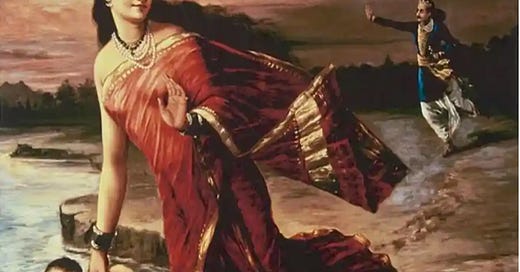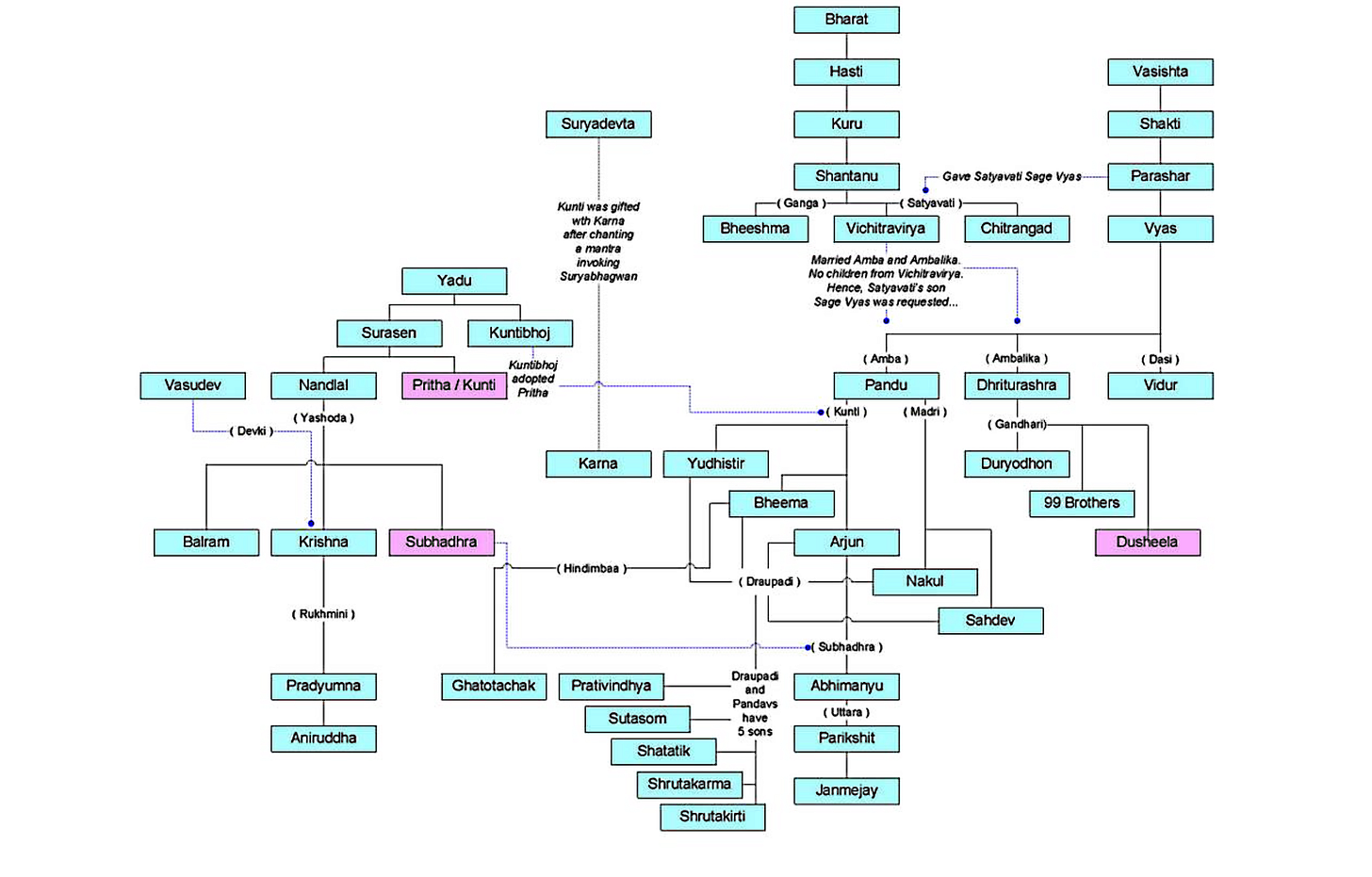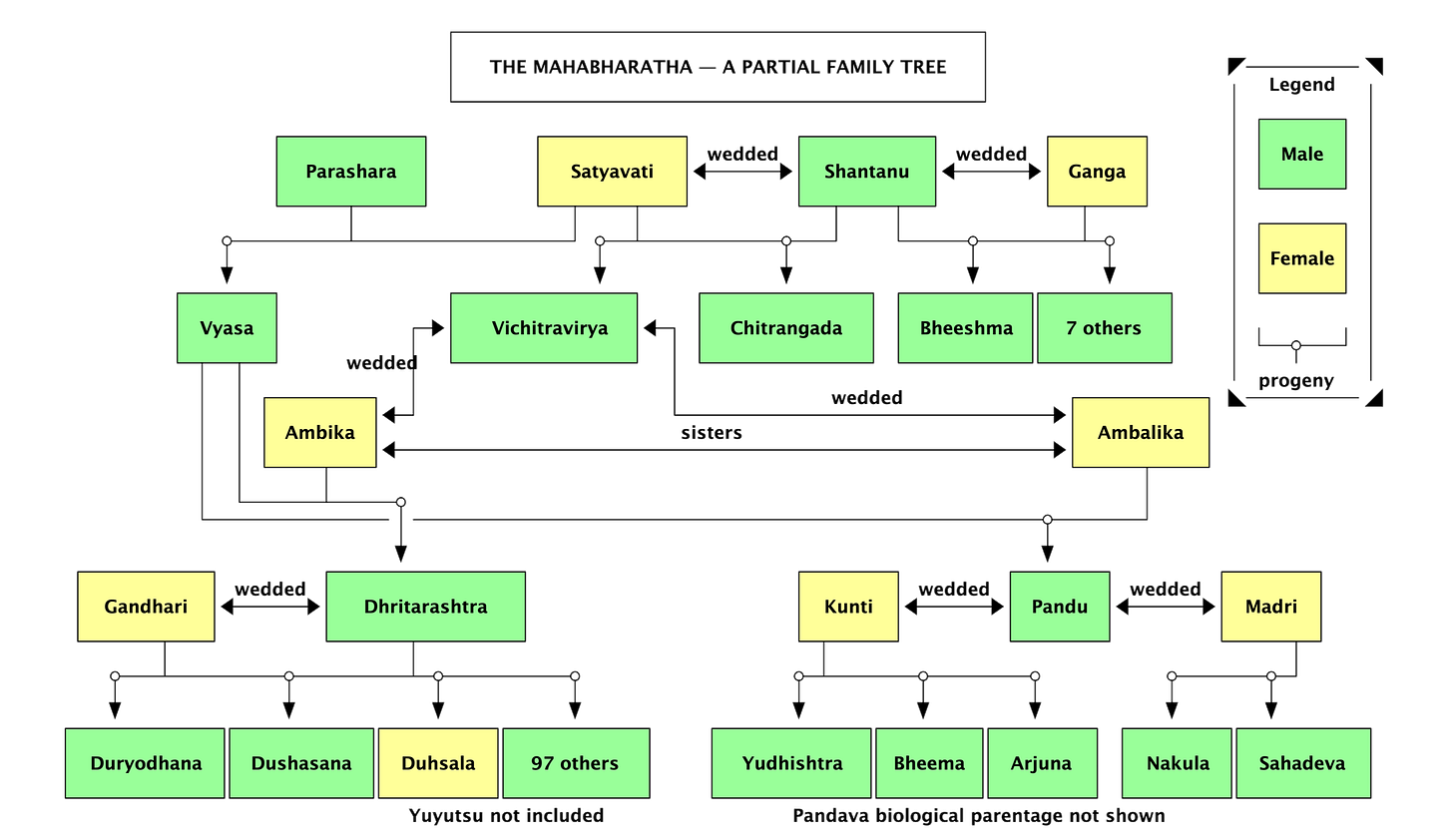🌹 Hello, my beloved family! I welcome you back to Agama's Message, your very own portal to the realms of wisdom and spirituality. This edition marks the beginning of an episodic series on the Great Mahabharat. In this series, I will be sharing my understanding of the characters and the teachings from the Mahabharata, the grand epic, a historical record of the destruction and rise of kingdoms and their dharma.
The reason why this series is so special is
It contains the finest details from the Shrimad Bhagwat Mahapuran.
Clear description of the characters and their association with the Epic.
My transparent understanding.
The Shrimad Bhagwat Mahapurana is considered an incarnation of God itself. Compiled by Shri Ved Vyas, it contains the backstory and details of Bhagwan Shri Vishnu's avatars.
An Introduction to Mahabharat ⚔️
The Mahabharat is the longest written poem ever by Maharshi (Great Sage) Ved Vyas. It consists of over 100,000 ślokas or over 200,000 individual verse lines (each śloka is a couplet), along with long prose passages.
The Mahabharata stands at about 1.8 million words in total.
The Mahabharata, an epic poem of poetic brilliance, narrates the saga of the Kuru Dynasty and the infamous war ⚔️ of Kurukshetra, renowned as one of the largest, most savage, and brutal conflicts in history.
Within the Mahabharata lies the invaluable treasures of the Bhagavad Gita and the Vishnu Sahasranama Stotra, profound spiritual texts revered for their timeless wisdom and significance.
Lineage: Understanding the Family Tree ✨
King Shanktanu had two wives
Maa Ganga (the river in human form) - Son: Devvrat (Bheeshma) and 7 others
Satyavati - Son: Vichitravirya & Chitrangada
Satyavati has another son from Sage Parashara, the author of Brihat Parashara Hora Shastra, which forms the basis of Vedic Astrology today. This son is named Ved Vyas, who is considered chiranjeevi, meaning he is immortal & also the author of Mahabharat. ✨
This Episode of Mahabharat is dedicated to Devvrath also known as Bhishma Pitamaha
Bhishma Pitamah : Devvrath 🛡️
In the beginning, Maa Ganga 🌊 and King Shantanu fell in love, and upon Shantanu's proposal for marriage, she agreed under the condition that he would never inquire about her actions. They wed, and she later bore a son, whom she tragically drowned. Bound by his promise, Shantanu refrained from questioning her, fearing her departure. Subsequently, seven sons met the same fate at Ganga's hands.
As Ganga prepared to drown her eighth son, Shantanu, overwhelmed with grief, broke his vow and demanded an explanation for his son's fate. Moved by his plea, Ganga spared the child and vowed to return him when he reached adulthood, leaving King Shantanu with this promise.


This boy happened to be Devvrath, who later became renowned as one of the most formidable figures in the Kurukshetra battlefield, engaging in warfare at approximately 118 years of age. He holds the record for the highest number of kills in the Mahabharat war. He received rigorous training in combat from the revered Lord Shri Bhagwan Parshuram. Additionally, he was granted celestial weapons by the king of the devtas, Indra. Moreover, Devvrath acquired knowledge in political and other sciences through instruction from Dev Guru Brihaspati (associated with Jupiter) and Daitya Guru Shukracharya (associated with Venus). Such was the exceptional greatness of Devvrath.
Devvrath, renowned for his steadfast adherence to dharma, notably honored his vow of celibacy, which he pledged to Satyavati, his stepmother. This promise was made at her behest, as she sought to secure the throne of the illustrious Kuru dynasty for her own son.
Hence, due to his great sacrifice and the terrible vow to remain celibate and a servant to the kingdom, he earned the name Bhishma from his father Shantanu, along with the blessing of "Iccha Mrityu," meaning death at will.
Bhishma specifically promised to stay alive until Dharma is established in the Hastinapur Kingdom.
Subsequently, the situation took a downturn. Satyavati's two sons, Chitrangada and Vichitravirya, faced challenges. Chitrangada passed away, while Vichitravirya, plagued by alcoholism, married Ambika (mother of Dhritarashtra) and Ambalika (mother of Pandu). Unfortunately, Vichitravirya died before he could impregnate his wives, leaving the kingdom without a successor. In this dire circumstance, Satyavati summoned her son Ved Vyas and requested him to bless the widowed wives of Vichitravirya with sons through the ancient custom of niyog pratha.
Niyog is not an act of lust but a ritual performed.
Now, Dhritrashtra was blind but physically powerful, while Pandu was weak physically but skilled in political science. Eventually, Pandu was given the kingdom on the suggestion of their third brother, Vidura. However, Pandu was cursed.
Pandu saw a couple of deer in the process of coitus and shot arrows at them. Later, he discovered that it was the sage Kindama and his wife who were making love in the form of deer. The sage cursed him that if he ever performed the act of intercourse, he would die on the spot. (We will discuss this event in later editions.)
In short, Hastinapur remained without a rightful king for an extended period, leading Devvrat to metaphorically endure a self-immolation. He suffered the indignity of being treated as a servant and slave by his own nephew and grandchildren. The once-glorious throne lost its luster amidst internal family conflicts. Devvrat, the most powerful individual on the planet, endured a life of agony and sorrow. He witnessed his own granddaughter-in-law being publicly disrobed and humiliated in the court, unable to intervene due to his solemn vow to serve the throne.

But Why?
Why did Maa Ganga drown her children?
Why did Bhishma suffer all his life before internal self-immolation?
The Curse of the Eight Vasus
The eight vasus are the eight demi-gods Anala, Anila, Soma, Ahas, Dhara, Dhruva, Pratyoosha and Prabhasa. Together, they represent the very elements of the Mother Nature.
Once, the wife of Prabhasa persuaded her husband to get her a cow which actually belonged to Rishi Vashisht 🌟. Prabhasa was initially reluctant to ask for anything from a Brahmin but disarmed by the usual weakness of a man towards his wife, he agreed to steal the cow for her. With the help of his seven brothers, the eight vasus purloined away Vashisht’s cow for Prabhasa’s wife. Rishi Vashisht, through his ascetic powers, figured out that the stealth was an act of the vasus. He cursed the eight vasus to be born on earth as mortals and suffer the pain like all mortals do.
The eight vasus begged Rishi Vashisht 🌟 for mercy, but a curse could not be taken back. It could, at best, be modified. Rishi Vashisht 🌟 granted some relief to the seven vasus that their lifetime on earth would be short and after that they could ascend to paradise. But the eighth vasu, Prabhasa, who instigated the other seven to steal the cow out of his passion for his wife would suffer the pain of the account of all the seven vasus.
He who committed a crime out of desire for his wife will never know the pleasure of a woman. Even without a wife and sons, he will spend his entire life struggling to serve his household. And in the end he will die at the hands of a woman, for his desire for a woman made him turn vasus into criminals.
The eight vasus then went to the Mother of all beings, 🌊 Ganga to help them keep their stay on earth short. Ganga, 🌊 who too was cursed by Brahma to suffer as a mortal on earth promised them that she would give them birth through her own womb and will drown them in the waters of Ganga to set them free from the curse the moment they would be born. Ganga drowned the seven vasus immediately on their birth, but Rishi Vashisht’s curse came true when she was about to drown Prabhasa and she was stopped by Shantanu. It was Prabhasa who grew up as Devavrata / Devvrat, later to be known as Bheeshma for his terrible oath, the oath that will be the cause of all his suffering and also, in a way, the cause of the Kurukshetra war. ⚔️
🌟Time to learn from Bhishma’s Mistakes
During the Kurukshetra war, Bhishma embodied the literal definition of destruction as he fought relentlessly on the side of Duryodhan. Day after day, the Pandavas' army faced the devastating onslaught, struggling to withstand the formidable force that Bhishma brought to the battlefield. ⚔️
❤️ Shri Krishna, who had previously vowed not to fight in the battlefield, rose to his feet and assumed his fierce form to impart a crucial lesson to Bhishma. Witnessing Krishna transform a wheel into the powerful Sudarshan Chakra to confront him, Bhishma was humbled and dropped to his knees. He questioned the true identity and intentions of Krishna, querying why he was willing to break his own vow. ⚔️
In response, Shri Krishna ❤️ revealed his divine Chatur Bhuj Vishnu form to Bhishma, elucidating the importance of adapting to changing times and circumstances. He explained to Bhishma the folly of clinging rigidly to outdated vows and principles when the situation demanded flexibility and adaptation. Kanha ❤️ (Krishna) went on to explain that it was due to Bhishma's unwavering vow and adherence to certain principles that the Mahabharata war was unfolding as it did.
Dear readers, in the Mahabharat, nothing has been sugarcoated to portray anyone as extraordinarily great or holy. Their experiences mirror our own, as we, too, can become so stubborn that a Mahabharata unfolds within us. Our reluctance to change ideological beliefs can pose a threat to ourselves and those around us. I urge you all to cultivate understanding and open-mindedness, embracing the opportunity to learn new things, adopt new qualities, and discard old and outdated ones. This doesn't mean disregarding our beliefs and customs but understanding their reasons; having an understanding of the current situation is essential for our growth and collective well-being.
Remember, karmas come back! Be mindful.
Closing Remark
Thank you 🌹 for sticking around for this long. I know it is challenging to understand this complex storyline, and I request you to re-read it to understand it properly. Feel free to drop a comment or ask me a question at agamashakti@gmail.com
Make sure to share Agama's Message with your friends and family.
Episode 2 will not follow this episode. Everything I write serves as personal motivation and is guided by a higher power. I hope you found value in this edition of Agama's Message. With Love.
yours, Vishal Rajput ❤️









